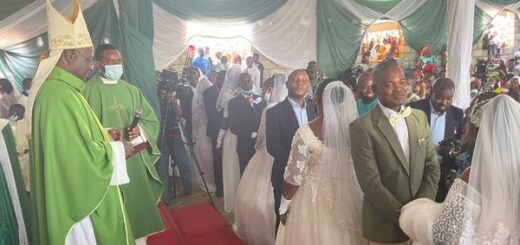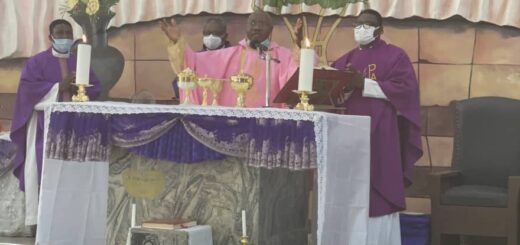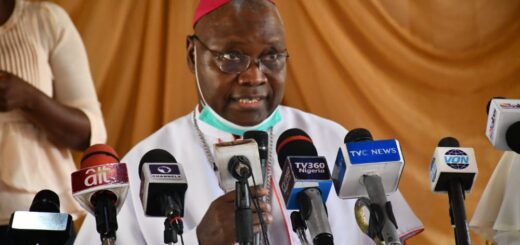The Mission of Love
by ARCH BISHOP · May 15, 2022
Fifth Sunday of Easter, Year C, May 15, 2022, St. Louis Pastoral Area, EFAB Global Estate, Mbora, Abuja. Homily by Archbishop I. A. Kaigama
Readings: Acts. 14: 21-27; Ps. 144(145): 8-13; Rev. 21: 1-5; Jn. 13: 31-33, 34-35
I desired so much to come to St. Louis Pastoral Area, Efab Global, today, especially as Fr. Patrick Alumuku kept reminding me about my visit. His greatest concern was simply for the Archbishop to come and pray with his parishioners, bless those gathered for prayer, confirm some candidates, and to see the progress being made since the creation of the pastoral area. Remember that fifty other pastoral areas were created along with yours. I must say yours has come a long way. So much has happened in so short a time. You started a church building you have been working on and Fr. Alumuku tells me how supportive you are of his pastoral work among you. He tells me about how generous many of you have been. May God bless and reward you without measure.
The first reading from Acts 14 tells us about the early missionary journeys of Paul and Barnabas. They travelled through Lystra, Iconium to Antioch and went on to Pamphylia, Perga and Antioch, etc, to give support and encouragement to Christian converts to persevere in the faith. Paul and Barnabas were able to achieve three things during their first missionary journey:
1) They established new Churches and welcomed new members into the Church through baptism.
2) They put fresh hearts into the disciples by visiting and encouraging them to remain firm in the faith.
3) They brought back report of their pastoral labour to the general assembly of believers.
My visit today is a continuation of the missionary drive of the Apostles. You see me carry the pastoral staff, a symbol of the Good Shepherd and the governing office of a bishop; the mitre is symbolizing tongues of fire that descended on the heads of the Apostles at Pentecost; a ring, signifying that a bishop is wedded to the Church. I am here like Paul and Barnabas to pray with you and to strengthen your faith so that you continue the good work you have been doing; to remind you not to forget that part of your baptismal commitment is to be witnesses of Christ and to support the work of evangelization in whatever way you can.
On Friday, almost at the end of my office hours, a priest came to tell me that a parishioner had donated three million Naira and wanted me to use it for any of the new pastoral areas. At 4:00 pm I was visiting a pastoral area which became the lucky beneficiary. When I announced at the end of Mass the donation, there was a hysterical jubilation by the congregation. I asked them to use the donation to start a foundation for a small office, and when completed, the office will first be used as a priest’s house, so that the priest can stay closer to the church. One man in the congregation whispered to the priest in-charge that he was donating five million Naira for the office project, again to a prolonged jubilation of dancing and singing by the people. I applaud you all for your generous and sacrificial giving to the Church for the spread of the gospel even in the midst of current hardships.
John makes a profound statement at the end of today’s Gospel by saying: “by this love you have for one another, everyone will know that you are my disciples.” The early Church understood this commandment and lived according to it, that is why they were called Christians in Antioch (cf. Acts. 11:26). Today we pray that our love may be concrete enough to convince people about God’s love and authenticate our discipleship of Jesus Christ.
Last Thursday, May 12, while we were at the maiden National Conference on Interreligious Dialogue, on “Rethinking Interfaith, Cultural, Ecumenical and Religious Dialogue In Nigeria’s Pluralistic Context,” held at Veritas University, Abuja, to collectively seek further ways of enhancing religious harmony and peaceful co-existence, we were saddened by the news of the attack and gruesome murder of Miss Deborah Yakubu, a student of Shehu Shagari College of Education, Sokoto, accused of religious blasphemy. There are commendably many Christians and Muslims speaking out in condemnation of the dastardly act of killing a human being in the name of religion. In condemning the act and dissociating it from the true practice of Islam, one Muslim mentioned and I quote him, “love is the first religion”.
Together, we must not give up on the struggle, to continue to bridge the gap that keeps us far apart because of religious bias, ethnic rivalry and other artificial categorizations. We must not allow our religious values to be redefined by fanatics, criminal and dubious elements of society. We must continue to speak up in a common voice and act in solidarity with one another against the evils of our time.
Also on Thursday, 12th May, the Muslim World League (MWL) convened a ground-breaking conference to build bridges among followers of Religions in Riyadh, Saudi Arabia, with the support of the Vatican, leaders of evangelical churches, internationally renowned rabbis, and other prominent leaders. They outlined the basic agreements endorsed by all the faiths represented: To reach a universal consensus in the context of a shared vision of civilization to strengthen cooperation and trust among global spiritual leaders; to underscore respect for the common principles of human values; the promotion of values of moderation and harmony; giving concrete support to efforts that advance tolerance and peace, and to establish rational intellectual frameworks to immunize against the dangers of extremist ideology and behaviour, regardless of its source.
Their communiqué rejects the vision of an “inevitable clash of civilizations” due to religious issues. They also agreed that attempts to gain religious, cultural, political and economic advantages without respect for rights or ethics, and through forms of extremism, arrogance and racism, must be opposed (cf. Giancarlo la Vella, Vatican News).
St. John reminds us that all those who say, “I love God,” but hate their brothers or sisters are liars; for those who do not love fellow human beings in concrete ways cannot love God who is invincible (cf. 1 Jn. 4:20). Love, as taught in Christianity, Islam and the African Traditional Religions means to wish others well, to show compassion, mutual support and cooperation for what sues for peace, justice and equity. Love is gracious, merciful, slow to anger, rich in mercy and reaches out to all.
Our love for one another challenges us to break down the walls of enmity, hatred, apathy, disunity, segregation and strife that have torn families, communities, races, and nations apart. Love for religion, politics, and culture or for whatever cause must never make us take the life of another person, a life we did not create.
St Paul reminds us: “I may be able to speak in the languages of human beings and even of angels, but if I have no love, my speech is no more than a noisy gong or a clashing cymbal…. I may give away everything that I have, and even give up my body to be burned, but if I have no love, this does me no good” (1 Cor. 13:1-3).
There can be no true religion without love and there can be no genuinely religious person without the practice of true love. We, who call ourselves religious, must wear the “garment of love”. In a world of so much hate and strife, love is the cure. In a world of violence and tension, love is the cure. In a world of sin and vice, love remains the cure. In our world of immorality and wickedness, only love is the cure. In our world of un-forgiveness and bitterness, love and only love is the remedy.
In this month of Mary our Blessed Mother, let us humbly ask her to continue to teach us to love one another without prejudices or pre-conditions.




